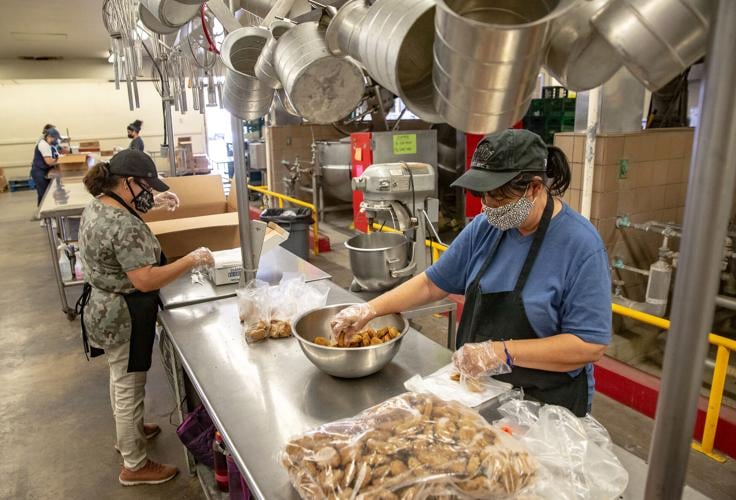Students at all Tucson Unified School District campuses will have a seat at the cafeteria table, thanks to the expansion of a federal free school meal program.
All 41,000 TUSD students at the district’s 87 schools will now be eligible to get breakfast and lunch every school day at no charge to them.
More than 50 emails from grateful TUSD families have come in to the district’s head of food services, Lindsay Aguilar, since the expansion was announced this week.
“Thank you ... I know that many hungry kiddos are going to appreciate this. Gracias,” one person wrote.
Another message in Aguilar’s inbox said, “This is amazing. Thank you to all that made it happen!”
“We’ve gotten, I think, over 1,000 views and hundreds of comments,” overwhelmingly positive, on the announcement, Aguilar said. “It’s been really heartwarming, especially when it comes to something like feeding kids.”
Currently, 60 TUSD schools qualify for federal free meals. Now all 87 schools with physical campuses can serve free breakfast and lunch; only the online Tucson Unified Virtual Academy isn’t eligible.
Household applications for free and reduced-priced meals are no longer required.
Paid student meal accounts at the 27 schools not offering the free meals before now will be refunded.
The expansion comes from recent U.S. Department of Agriculture regulation changes that make more families eligible. School qualification depends on the percentage of students automatically qualifying for free meals through SNAP benefits, the McKinney Vento Homeless Assistance Program, foster child status and Medicaid data.
“Hard to provide a (cost) figure since with increased meal participation comes increased food costs and labor costs,” Aguilar said. Lunches paid for by the program cost $2.50 at elementary schools and $3 at middle and high schools.
The schools not already offering free or reduced meals have about 1,200 past due accounts, Aguilar said. Eventually, these are paid off by donations.
The district must apply to participate in the federal free lunch program every four years.
The need is substantial. The poverty rate in the Tucson Metropolitan Statistical Area was 14.9% in 2022, says the University of Arizona MAP dashboard. By age breakdown, the highest poverty rate — 19.8% — occurred among those younger than 18.
According to the National Center for Education Statistics, 19.9% of TUSD families lived below the poverty level within the last 12 months and 29.3% received food stamp or SNAP benefits during the same period.
With expanded meals comes a greater need for nutrition services employees in the district.
There’s a 20% vacancy rate in district food service workers, the TUSD Governing Board was told in January. The Governing Board approved a funding increase for temporary staffing in food services to as much as $1.35 million per year, up from $850,000 per year.
The increase is aimed especially at hiring cafeteria workers. Aguilar said that will hold the school while the district hires staff through its own hiring process.
Still, she and the district administration are eating up the good news, which Aguilar estimated will increase breakfast participation by 5-10% and lunch participation by 10-20%.
“It’s unfortunate that our community qualifies for this” due to poverty, said TUSD Governing Board member Ravi Shah. “But it’s great that we have this opportunity to be able to serve our community more effectively.
“Hungry kids don’t learn. That’s time tested and true,” said Shah, who is a doctor.
It was tested by researchers in a paper published in the journal Nutrients. The authors found that schoolwide free meals had a positive effect on students, “particularly those who are food-insecure and/or near eligible for free meals.” The majority of studies reviewed found students getting free meals had increased participation in the classroom.
A 2020 study in the American Journal of Public Health states that “Emerging evidence suggests that schools that provide universal free meals experience positive impacts on student nutrition, behavior, and academic performance. In particular, schools benefit from increased meal participation rates.”
The nationwide study was on the federal free meal plan soon to be districtwide at TUSD.
Providing breakfast and lunch is "just like textbooks or technology devices that we provide to all students as part of the learning environment," Aguilar said.
Without free school meals provided by the pandemic, this development likely would not have happened, she said.
“The momentum coming out of COVID, in terms of being able to offer this to our children across the country, has helped tremendously validate the need.
“The two and a half years that we had the pandemic waivers for free meals has helped tremendously in terms of giving us some actual data — the costs were how many, the participation levels, the impact that it had on students, academic achievement, behavioral issues ... what it did for families ... financially and (in) stability,” she said.
Governing Board member Jennifer Eckstrom said, “Coming out of the pandemic, we were giving away food and people were utilizing that. I’m really hoping that more kids are able to eat in our schools.”
If Aguilar’s inbox is any indication, kids will definitely enjoy the benefit.
“This is a huge help to our family, especially as our grocery budget has doubled with inflation in the last year. I have four kids who attend TUSD schools, and the fact that all of them will now get two healthy meals a day at school is a giant relief,” wrote one parent.
“I want to thank you, thank you, thank you for taking care of the nutritional needs of all the students in TUSD without the indignity of applying for free or reduced lunch. This is the most amazing news I’ve heard in a long, long time and I’m so very grateful that you are able to pull this off! These are tears of joy.”
Get your morning recap of today's local news and read the full stories here: tucne.ws/morning






